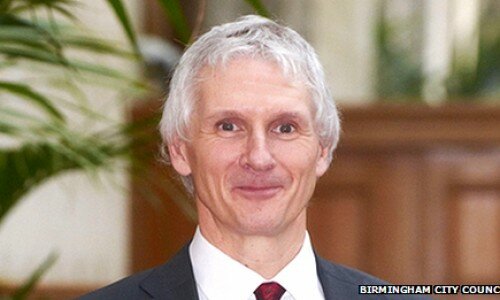
Cost of culture change – £3m council bill to deliver Kerslake
The cost to Birmingham city council of implementing the Kerslake Review recommendations has hit almost £3 million.
Extra funding is required to deliver the Future Council programme, a radical culture change initiative aimed at redefining the council’s role and relationship with the city, its citizens and its partners.
Embedded within the Future Council programme is the Organisational Improvement Plan based on which is subject to external monitoring and review by the Birmingham Independent Improvement Panel.
A cabinet report by council chief executive Mark Rogers makes it clear that change on the scale required cannot be achieved without additional investment.
Against a backdrop of further cuts in Government grant, estimated to cost Birmingham city council £247 million by 2021, Mr Rogers urges an “invest to save rationale” and adds: “Appropriate resourcing is required to deliver the necessary organisation redesign.”
The £3 million bill consists of £734,000 for financial planning and design of an operating model and service delivery models, £659,000 to develop the Future Council Programme and £297,000 for an initiative called Forward the Birmingham Way.
Some £115,000 is set aside to improve the council’s political governance, a key Kerslake criticism, and £864,000 is identified under “directorate funding”. Another £95,000 has been earmarked to help the council improve its work with external partners.
With £32,000 to develop a corporate planning and performance management framework, £2,000 for support services and £44,000 for contingencies, the total reaches £2.9 million.
The council has asked the Department for Communities and Local Government for funding for additional capacity and resources to deliver programme outcomes.
Mr Rogers sets out the challenges faced by Birmingham in his cabinet report:
The council has created one strategic change framework by which it will oversee the necessary change to address these issues so that there is a single, straight forward narrative for citizens, members, partners and staff.
It will be challenging to join together all this work and manage it effectively, especially when a key element is that the council needs to redefine its role and relationship with the city, its citizens and its partners.
The Future Council programme is the vehicle for doing this and delivering the changes we need to make. We have absolute timelines, some externally set, requiring us to move at pace, redesign our organisation, and meet the financial challenges each year.
This will require everyone to support the activity and process to deliver a sustainable organisation that puts local people and communities at the heart of everything it does and focuses on positive outcomes for citizens based on fairness, economic prosperity and democracy.
Mr Rogers describes an urgent need to “modernise, meet the unprecedented financial challenge and redefine the role of the city council in ensuring the availability of services that best meet the priority needs of citizens and communities”.
He continues:
As well as the significant policy and financial challenges facing the council, there are priorities and challenges in managing the impact of findings from a number of high profile external reviews. These are specifically in relation to children’s services, safeguarding and education, as well as the independent review of council-wide service operations, culture and governance conducted by Lord Kerslake.
The actions arising from these reports add further urgency to the progression of this programme.
We need to take a whole-council view so that the impact of change in one part of the organisation is understood on the rest and we create wherever possible, joined up solutions, leverage economies of scale and ensure consistency.
This is the only way to create a sustainable organisation that functions effectively.
Mr Rogers and council leader Sir Albert Bore were quizzed about progress of the Future Council programme earlier this month at the first public meeting of the improvement panel.
They revealed plans for a shake-up of senior management, but were put under pressure by the panel to explain slow progress in implementing the Kerslake recommendations.
Mr Rogers told the panel he had an agreement with Sir Albert about “gaps in strategic capacity and how they could be filled” and he was “on the cusp” of identifying detailed roles and funding requirements.
Similar Articles
Communication breakdown: WMCA hit by strange case of portfolio paralysis 9
There are 50 days to go until the West Midlands’ local government landscape changes irrevocably. On
Mosquito supporters demand police commissioner’s ‘immediate resignation’ 3
West Midlands Police Commissioner David Jamieson is conducting a “trial by media” against his deputy,
From zero to £10 billion in four years – the rise and rise of LEPs 3
The country’s 39 Local Enterprise Partnerships have shared £7.3 billion from the Government’s growth fund
MPs agree to repay £15,000 in Perry Barr Academy dontations 12
Three Birmingham Labour MPs have agreed to pay back £15,000 in campaign donations they received
Runners & riders: 2016 council elections, candidates and analysis 16
Candidates for the Birmingham city council elections on May 5 are under starter’s orders, with










